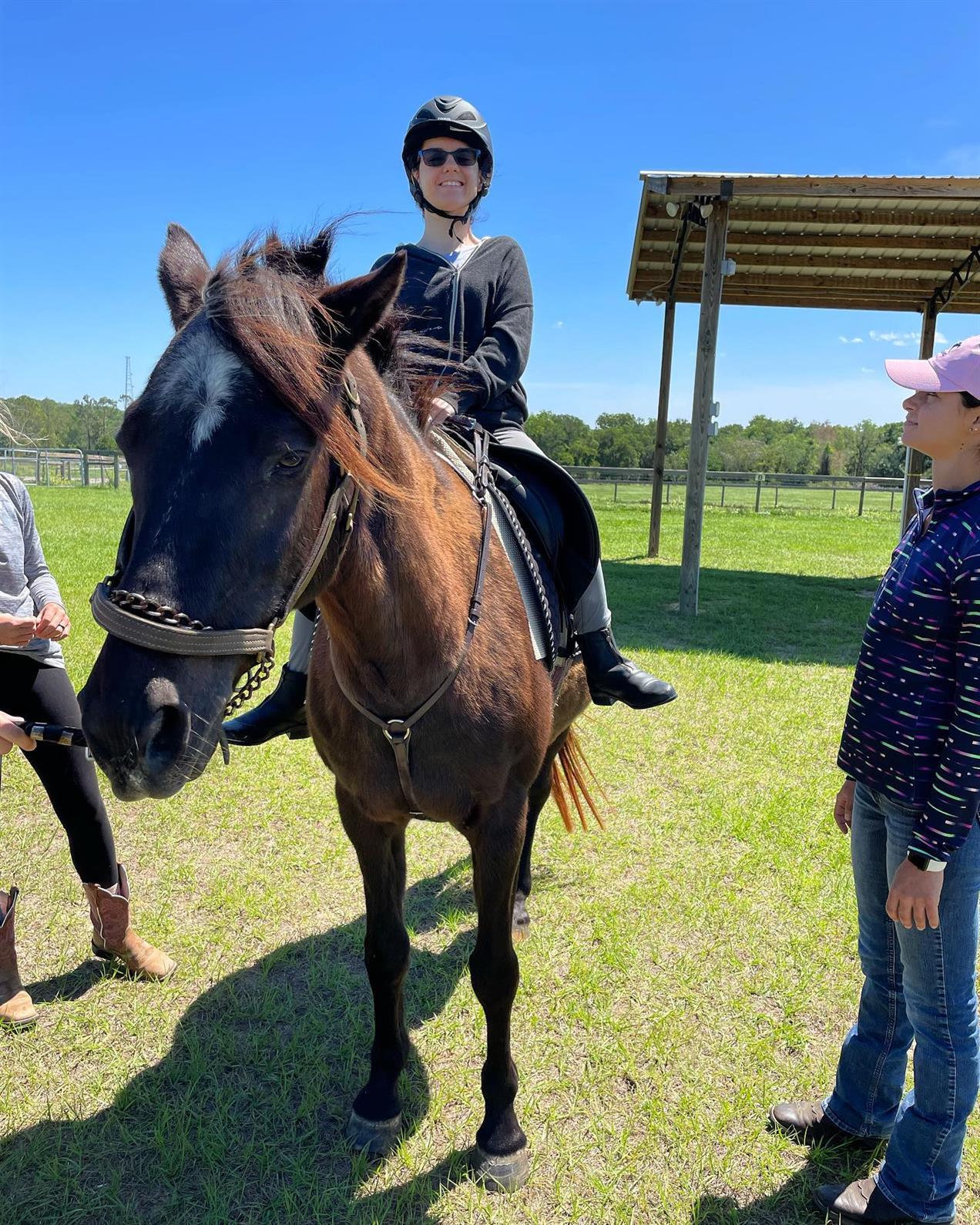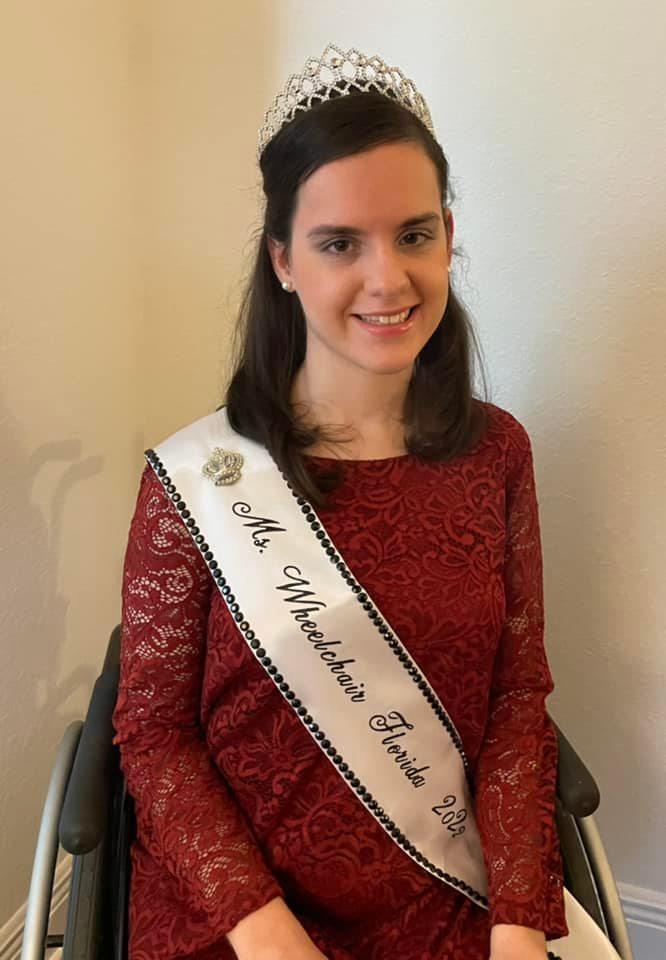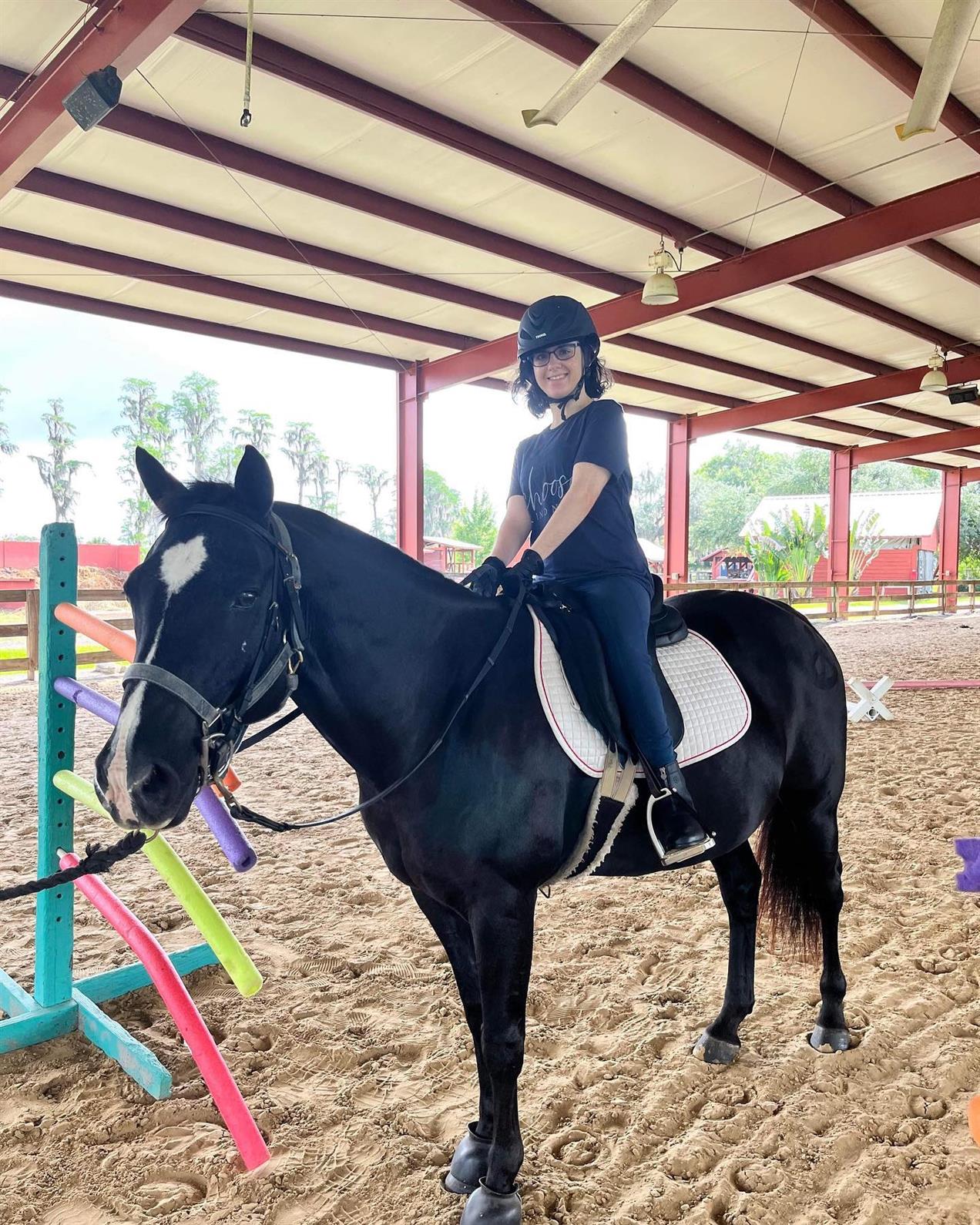Bryanna Tanase of Trinity, Fla., made the transition from therapeutic riding to para dressage in 2019. Now she’s a Grade I para dressage rider has high aspirations for her riding career. She won the Ms. Wheelchair Florida 2022 title and is using her platform to spread the word about equine-assisted therapy and para dressage. Tanase shared insights on her journey as an equestrian, what people should know about therapeutic riding and para dressage, and what it takes to be a para equestrian athlete.
- How did you get involved with horses?

(Courtesy of Bryanna Tanase)
“I have been a lifelong lover of horses but did not get the chance to be directly involved with them until I turned 17 in 2016. My parents got me a voucher for four therapeutic riding lessons at Quantum Leap Farm, and I have been riding there since then. In October 2020, I started riding at Emerald M Therapeutic Riding Center as well to further my knowledge and have more time around horses and in the saddle.
“I discovered horses on a preschool trip to a farm, where little me was mesmerized by a palomino pony. From then on, I spent my childhood learning as much about horses as I could from books, movies, video games, and the internet. My horse toys were my favorite, and I was always daydreaming about them. I also got to go on pony rides at the zoo and vacation trail rides but was never around horses for long. Although it was hard spending so much time without physically being around horses, I am glad that I had the opportunity to teach myself so much about them before I got to ride.
“I discovered the sport of para dressage when I was around 11 years old. I did an internet search to see if there were any professional riders with a disability. To my surprise, I found videos of riders like Roxanne Trunnell and Rebecca Hart giving their all in the arena with their horses. From the moment I watched them go down centerline, I knew I wanted to be part of the sport, too.
“Because I hadn’t been around horses consistently until 2016, I wanted to give myself time to get used to riding and being around horses before I started to pursue it myself. I started the transition from therapeutic riding to para dressage in 2019, and I received my classification as a Grade I para dressage rider in January 2020. It has been a wild ride since then, and I am so thankful and grateful for all the people who have supported me along the way. My biggest long-term goal is to qualify for the U.S Para Dressage Team and qualify for the Los Angeles 2028 Paralympics (hopefully).
“The horses that I ride, Griffin and Cappy, are my partners and best friends. Griffin is a Quarter Horse cross and Cappy is a Welsh pony-Thoroughbred cross. Griffin and I are working on the Grade I Novice Test A to resubmit a video to the virtual judging program and earn a qualifying score of 60% or above for the Emerging Athletes List. Emerging Athletes are the first level of athletes on the para dressage pathway. Cappy just came back into work from an injury a few months ago, so we are taking our time and continuing to build on our foundation. In March 2021, Cappy and I won our first blue ribbon through the Little Bit Therapeutic Riding Center Virtual Dressage Show.
“Shane, an American Paint Horse and my first official para dressage mount, passed away on February 28, 2022. We hit so many milestones together (and nailed lots of square halts) that I cannot thank him enough for working with me and allowing me to participate in the sport. I miss him terribly and think about him every day.”
- Tell me about your Ms. Wheelchair Florida title. How did the honor come about?

(Courtesy of Bryanna Tanase)
“Ms. Wheelchair Florida is a competition for women across the state who are full-time wheelchair users to compete to be the state advocate for the disability community in the state of Florida. Each woman has a platform they are passionate about that relates to disability rights or something they would like to improve for people with disabilities. My platform is ‘The Power of Horses: How Equine-Assisted Therapy Benefits People with Disabilities.’
“Although we do get dressed up on the last night of the pageant to present our platform speeches, Ms. Wheelchair Florida and its national equivalent, Ms. Wheelchair America, are not traditional beauty pageants. The winner is the best advocate, not the prettiest girl. I received the title this year and am doing my best to raise awareness of and get people involved in equine-assisted therapy and para dressage. As part of my reign, I will compete at the Ms. Wheelchair America National Competition in Grand Rapids, Mich., in August representing Florida among 30+ states and competing for the chance to be Ms. Wheelchair America.”
- How are you hoping to use the title as a platform to increase awareness of para dressage?
“One of the main ways that I am using my title as Ms. Wheelchair Florida is to increase awareness and promote both para dressage and equine-assisted therapy by attending virtual and in-person events with both people with disabilities and able-bodied people who have an interest in or a love for horses. For example, at the beginning of this month I attended Derby Day in Tampa Bay, a fundraiser for Emerald M Therapeutic Riding Center, as both a participant and the titleholder. I got the chance to speak to a veteran about my platform, and he was very impressed with it and wished me luck. During the last weekend in May, I am attending Family Cafe, the largest conference centered around disabilities in Florida.
“On my social media platforms, I also make informational posts about equine-assisted therapy and para dressage and share personal anecdotes about my time at the barn and my relationship with horses.”
- What was the transition like from therapeutic riding to para dressage?
“I remember the excitement I had the day I was going to get classified. It was the first big step I had to take to become a real para dressage athlete. When I found out there was going to be a national classification opportunity in January 2020 at the Adequan® Global Dressage Festival, I asked to be able to make the drive to Wellington as a Christmas present, and I got my wish.
“On January 9, 2020, my mom and I made the four-hour drive from Tarpon Springs to Wellington, and I was both giddy and nervous the whole way there. This would be my first time at a big competition venue as well, and I was not prepared for how much activity there would be. From the minute we stepped on site, there were horses and people everywhere. I was mesmerized by the huge, beautiful warmbloods at every corner.
“While I was taking in the sights, we made our way over to the show office to check in for classification. Once we were approved, we had to wait for a few minutes until we could go into the classification tent, so I browsed some of the vendor booths.
“During classification, an official classifier does a series of tests to test your range of motion, strength, balance, etc., and scores each test out of 10. They then average each score together and use those calculations to determine your profile, which then determines the Grade classification. Your Grade determines what gaits you will ride at, as well as what compensating aids you will be allowed to use during competition.
“I am a Grade I rider, so I only ride at the walk. As a result, I have the extra challenge of riding in a 20 x 40 dressage arena instead of the standard 20 x 60. There are five Grades you can be classified into, organized from the most physical impairment to the least. Grade I is for the most impaired, while Grade V is the most similar to able-bodied dressage.
“The transition from therapeutic riding to para dressage involves a change of mindset as well. While both are therapeutic for a wide range of disabilities, once you switch to para dressage and are committed to it, you are no longer riding just for fun; you are an athlete. There are a lot of things you have to learn technique- and rule-wise doing para dressage that you would not focus on in therapeutic riding.”
- What is the difference between therapeutic riding and para dressage?

(Courtesy of Bryanna Tanase)
“Therapeutic riding is recreational horseback riding adapted to the individual abilities of disabled people. You learn horsemanship skills and the basics of riding in an accessible environment. Many people in therapeutic riding have and achieve the goal of riding independently.
“Para dressage is the equestrian discipline of dressage adapted to fit the needs of people with disabilities. The prefix para means ‘equal to,’ not paraplegic. Para dressage athletes and horses are held to the same standard as their able-bodied counterparts. The judging standard is the same, and both groups of riders have the opportunity to compete nationally and internationally. As mentioned above, there are five different para dressage Grades. The Grades allow for fairness in competition in that athletes of the same or similar ability compete together.”
- What do you want people to know about para equestrian athletes and para dressage?
“That we are real athletes, just like everyone else who participates in equestrian sport, we just need a little bit of extra help to reach our goals. We are just as, if not more, dedicated to our sport, and we love and cherish every horse we get to partner with. Dressage is already difficult enough, and the difficulty becomes ten-fold when you deal with physical challenges and have to work twice as hard just to do what you love.
“Para dressage is not boring. It may not look like we are doing a lot, but it is a big deal to us and the people and horses that we are fortunate to work with. Please support us, please see us. This sport is not for the faint of heart. There is a lot of hardship that is associated with being in the sport, both financially and logistically, and para dressage is just now beginning to be recognized on the same level as able-bodied dressage.
“Para dressage athletes are so fierce and passionate. We have to do a lot of extra work out of the saddle to make sure our bodies can handle the ride, and we still give our all even when our bodies are working against us. Our horses have to have a heart of gold and the right temperament to be able to dance with us safely in the sandbox, as well as to learn how to respond to the unique way we give aids.
“Even though para dressage athletes are starting to get more recognition and visibility, ableism—or the favoring of the able-bodied over the disabled—is still very prevalent in the equestrian community. Many competition venues are not wheelchair accessible, causing athletes and their teams to have to develop their own unique systems to mount. Some barns are so inaccessible that riders with mobility devices cannot even get through the barn aisles to pet the horses. Some trainers still turn away riders with disabilities when they try to ride somewhere other than their local therapeutic riding centers due to liability and insurance issues or their own biases. Sometimes, no matter how much someone wants to help, there are too many barriers in the way for us to work together and we have to give up on the opportunity and try something else. Although there are not many Centers of Excellence in the country, stables who may be interested in becoming one can visit the following link to find out more and help increase access for para riders: USEF Para-Equestrian Dressage Centers of Excellence.
“If you are a part of the able-bodied equestrian community and you have the chance and/or resources to work with a para dressage or other para equestrian athlete, do it. We may surprise you and you will gain a valuable asset to your barn and program.”
- How can people who are in therapeutic riding programs get on the pathway to para dressage?
“If you live near one of the USEF Para-Equestrian Dressage Centers of Excellence, visit them to meet the staff and learn how they can help you make the transition into the sport and begin the journey along the pathway. If you do not live near a Center of Excellence, consider contacting Laureen Johnson, USEF’s Director of Para Equestrian, about scheduling a national classification and work with your coaches and the resources you have at your disposal.
“You can also reach out to Lisa Hellmer, the new Para Dressage Development Coach, for help on your para dressage journey. She is a Silver USEF Para Dressage Coach who earned her United States Dressage Federation bronze and silver medals and has a wealth of knowledge about the sport. I had the opportunity to meet Lisa in 2019 when I first started in para dressage, and I still hope to ride with her one day. She is extremely kind and wants to make sure everyone has a great experience, regardless of ability.”
- What resources are available for people who are interested in learning more?
United States Para-Equestrian Association
USEF Learning Center: Pathway to Para-Equestrian Dressage
USEF Para-Equestrian Dressage Centers of Excellence
Professional Association of Therapeutic Horsemanship International (PATH)


